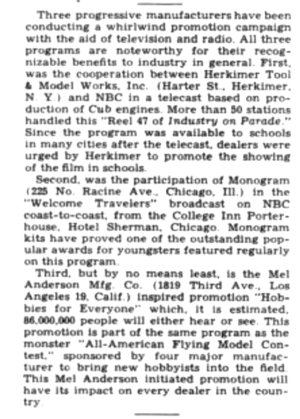IOP Ep 47
IOP Ep 47 is a short film.
| IOP Ep 47 | |
|---|---|
| Produced by | National Association of Manufacturers |
Running time | 00:13:40 |
| Language | English |
Segments
Food for America's Future! Manufacturing baby food. Gerber, Fremont, MI
Concrete with the Bends! Testing concrete beams. Austin Co., Cleveland, OH
Public Transit Centennial! Transportation planning. San Antonio Transit Co., San Antonio, TX
Air Power in Miniature! Manufacturing miniature engine models for experimental work. Herkimer Tool & Model Works, Herkimer, NY
Partial (very partial) Transcript
For hundreds of years, people have come to America to live under a way of life that gave them the spiritual satisfactions that could be realized only under personal freedom. Here, they found religious freedom, where they could worship in a church of their own choosing; political freedom, where they could vote for a candidate of their choice; academic freedom, which has meant a better education for all; and economic freedom, a private enterprise system that has enabled all of us to attain the highest standard of living in the world. It’s up to each of us to guard these freedoms, which have made America great.
From Book
Bentley, Amy. Inventing Baby Food: Taste, Health, and the Industrialization of the American Diet. University of California Press, 2014.
From the postwar period through the mid-1960s, baby food processing plants churned out their products in record numbers. Commercial baby food seemed an embodiment of postwar American production capacity in general. Illustrating this accomplishment, a 1951 “Industry on Parade” newsreel featuring Gerber touted the company’s ability to “capture the seasons” through canning, thanks to new farm technology and advanced processing techniques. With heroic, optimistic music typical of the period in the background, a jaunty male narrator’s voice guides the viewer through the processing of Gerber strained peas. First, the peas are harvested in the fields by a new combine that “can take peas out of the pods at the rate of eighteen thousand pounds a day.” The action then shifts to the “smoothly functioning mass production techniques” that clean, blanch, remove the skins, and add “what slight seasoning is permitted in food for babies.” Then the puree is packed into jars. The seemingly endless stream of glass jars speeds along on the conveyor belt and are filled with puree, sealed with lids, and cooked further. The jar of peas finally makes its way to a woman, who, after warming the jar in a pan of hot water on the stove, empties the contents onto a plate and places it in front of her baby, who is sitting in a high chair. “In less than a generation,” the film’s narrator informs viewers, “the baby food industry has grown from nothing to the point where it supplies the victuals for ten million Americans.”
More Details
Industry on Parade was a short television program that aired in the U.S. from 1950-1960. It was produced by the National Association of Manufacturers. The series demonstrated complicated industrial processes that transformed raw materials into finished products.
